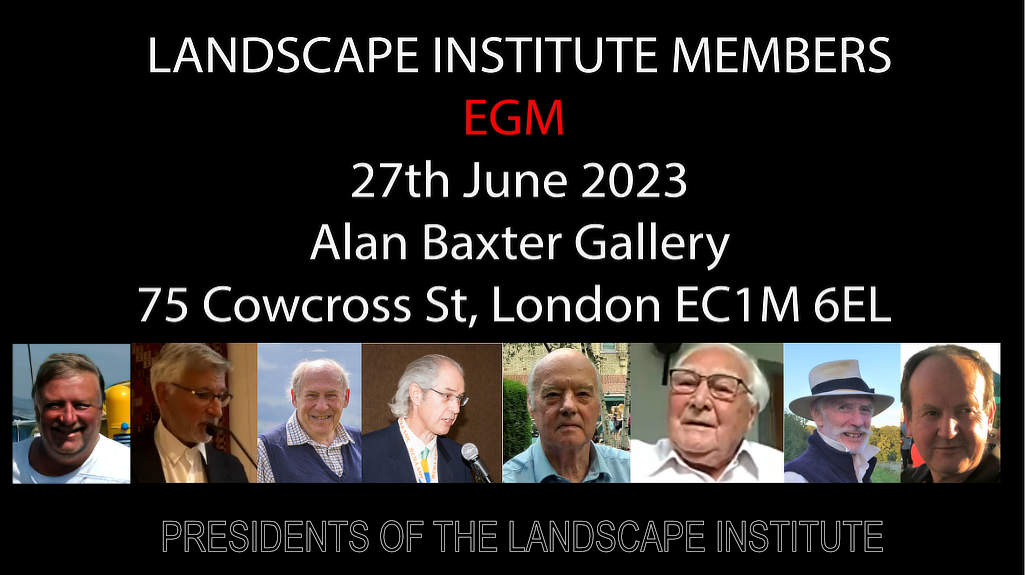Landscape Institute Members EGM June 2023

Following the Landscape Institute’s (LI’s) governing documents a large group of members, including 7 past presidents, requisitioned an Extraordinary General Meeting (EGM) on 27th June 2023 (in London and on Zoom). As reported in the videos of the meeting (above and below) the LI Board of Trustees did everything they could think of to block the meeting, presumably because they are terrified of open discussion of the secretive and improper actions taken to block Brodie McAllister. He was the democratic choice of LI members to take office as president in June 2022. The Board’s actions have been reported on the LAA website, on YouTube, in the press and elsewhere. The Board’s actions were dressed up, misleadingly, as actions by the Advisory Council (which has few powers and no budget). Board members were heavily involved.
The EGM went ahead and we invite members to watch the videos and judge its veracity for themselves. Though familiar with many details of the case, I found the EGM very refreshing. Its focus, under the wise chairing of Tim Gale (a former LI President), was on the case of The Missing LI President. But in 54 years of LI membership, it was the first open discussion of the Institute’s aims, objectives and performance. Since I have a deep concern for the welfare of the landscape profession and the expert skills it serves, I found the discussion enlightening. As Tim remarked towards the end of the EGM, it raised many issues that will have to be resolved if landscape architecture is to flourish in the UK.
The key points in The Case of the Missing President are as follows:
- In June 2022 Brodie McAllister was democratically elected as the LI’s next president (to take office in July 2022). Since the LI Royal Charter states that the Institute ‘shall have a president’ the 2022-4 president must be Brodie McAllister.
- Obviously, the member’s choice for a new leader should have been respected by everyone.
- The conspiratorial removal of a president has uncomfortable echoes of totalitarian ‘elections’ and the setting aside of results.
- An independent review of how and why the President Elect was removed is crucial to the future wellbeing of the LI and the profession it serves.
- Board members provided all the evidence for action against Brodie. They took the decision to spend heavily on legal services to prosecute the case (in the 2021-2 financial year alone this amounted to £170k, which equals the LI’s entire income from registered practices). The lawyers were instructed to conduct an extensive trawl to collect evidence. This should not have been done.
- The Board should have used discussion, mediation or arbitration to clear up the issue. This would have been normal management practice. As I commented at the EGM, this was highly inappropriate.
- As the UK government explains ‘Whistleblowing is the term used when a worker passes on information concerning wrongdoing. In this guidance, we call that “making a disclosure” or “blowing the whistle”. The wrongdoing will typically (although not necessarily) be something they have witnessed at work.’ Typically, the law protects the weak against the strong as, for example, when an employee reports that the employer is installing flammable cladding on a residential block. In the LI case ‘whistleblowing’ was used by the strong (ie the Board) to attack the weak (ie a candidate in an election).
- According to lawyers, the only aspect of the case against the Missing President which could possibly be seen as whistleblowing was unproven and denied by Brodie. This was the brief appearance of an imposter at a small internal teams meeting. Since the meeting was internal, this cannot possibly have harmed the public interest.
- As former LI President Merrick Denton-Thompson stated at the EGM, the action against Brodie is best understood as ‘settling old scores’.
- As soon as the election result was announced, Vice President Noel Farrer declared in an email to Merrick, that he did not accept the member’s choice of next president. This was followed by three attempts by board members to rid itself of Brodie. One of the attempts was made by Carolin Göhler, who was appointed President Elect in June 2023. There was no election, presumably because becoming an elected officer in the LI has become an unattractive prospect.
- The identity of the individual, who made the disclosure that drove the 3rd attempt to get rid of Brodie, is unknown. Many members believe it was the then-president of the LI Jane Findlay. If correct, this is extremely unusual for a whistleblowing disclosure.
- As Hal Moggridge, a very distinguished past president, declared at the LI EGM ‘Democracy requires that elected president should assume the presidency unless a convicted criminal… having examined the committee of inquiry report I am convinced the process adopted was completely illegitimate the procedure against McAllister appears faulty, secretive and unworthy of our membership organization.’
Should the Case of the Missing President lead to years of infighting (and the collapse of the Landscape Institute?) Hal Moggridge’s statement will provide a suitable epitaph.
President Thomas Jefferson, let us never forget, declared that: ‘The basis of our governments being the opinion of the people, the very first object should be to keep that right; and were it left to me to decide whether we should have a government without newspapers or newspapers without a government, I should not hesitate a moment to prefer the latter.’ (1787). Jefferson admired the English Landscape Movement and has two great design projects to his credit: his own estate at Monticello and the layout of the University of Virginia, which he founded.
